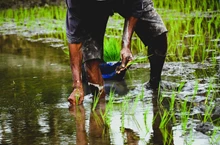
In the ever-evolving landscape of agriculture, where climate change presents unprecedented challenges, scientists are turning towards technologies like artificial intelligence and machine learning to safeguard food security. A study published in the Proceedings of the National Academy of Sciences sheds light on a predictive model utilizing machine learning algorithms to forecast the impact of climate change on rice yields.
A New Era in Crop Prediction: The Role of AI in Agriculture
Led by Assistant Professor Diane Wang and post-doctoral researcher Sajad Jamshidi, the research team from Purdue University, in collaboration with Cornell University and the Dale Bumpers National Rice Research Center, has developed a machine learning model. This model demonstrates the potential to predict how rice yields will be affected by shifting climate patterns. By analyzing factors such as weather conditions and genetic traits, the model provides insights into the resilience of modern rice varieties compared to their older counterparts.
The study marks an advancement in agricultural research, highlighting the power of artificial intelligence (AI) and machine learning (ML) in addressing complex agricultural challenges. Wang explains, "With these kinds of large-scale statistical models, you're taking a set of predictors—like weather or genetics—and mapping them to solve for an outcome. Here, we are interested in predicting yield."
Harnessing the Power of Data: From Seed Varieties to Predictive Modeling
Central to the study is using historical data and genetic information from rice varieties spanning several decades. Through analysis and the integration of diverse machine-learning techniques, the researchers have constructed an ensemble model that offers greater accuracy in predicting rice yields under varying climatic scenarios.
Moreover, the study underscores the crucial role of public breeding programs in enhancing the genetic diversity of rice crops. This diversity, in turn, bolsters their resilience to climate change. "The ensemble model predicts that modern groups of rice varieties will do less badly than groups of older varieties, but I would be careful to say we've finished our job," Wang cautions. "There is a lot of uncertainty concerning future climates, and these kinds of models are just one tool to explore scenarios."
As the agricultural sector braces itself for the challenges posed by climate change, advancements in AI and ML are proving to be indispensable tools in securing global food security. With further research and experimentation, scientists aim to unlock the full potential of these technologies to ensure a sustainable future for agriculture.











